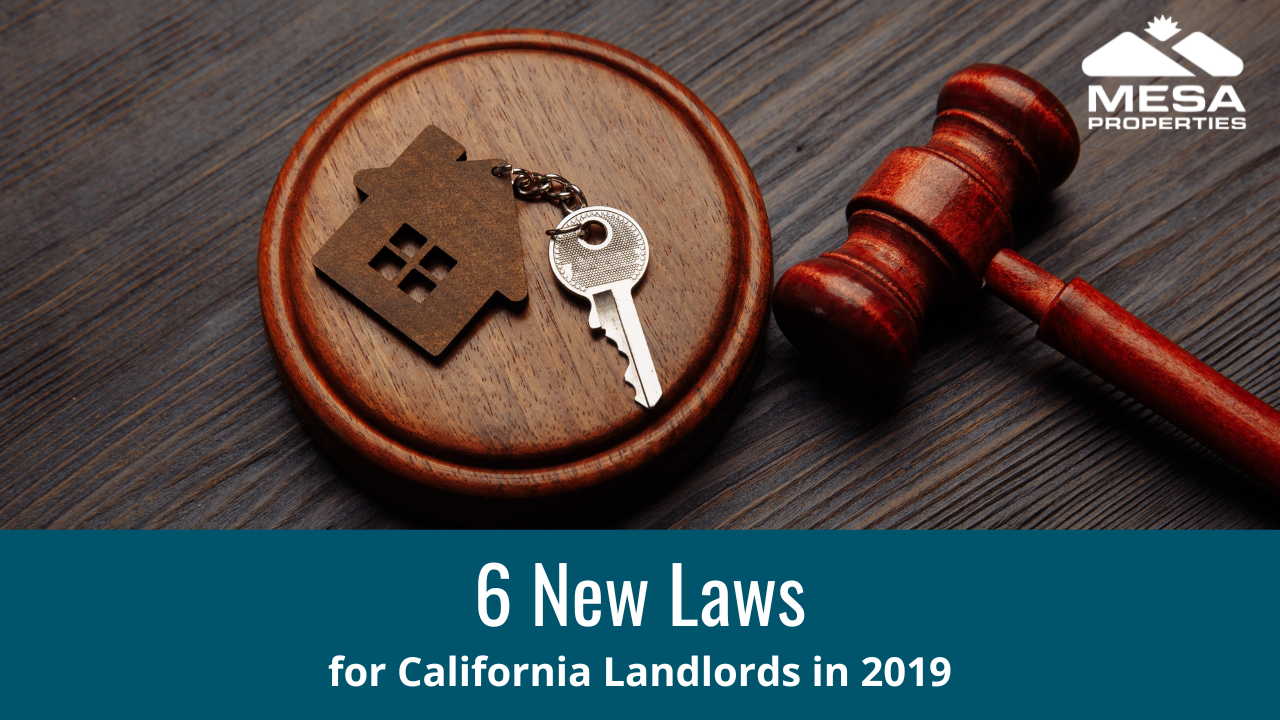There are two types of people in this world. Those that make New Year’s resolutions, and those that don’t. Some people are making resolutions to lose weight by going to the gym every day. Others could care less about New Year’s resolutions because they know that 80% of them will fail by February. If you happen to fall into the second category, don’t worry. The California legislators have made resolutions for you! Here is the Mesa recap of all the new laws and regulations that landlords need to be aware of in 2019.
Mandatory Balcony Inspection
This new law dates back to 2015 when 13 college students were standing on a balcony when it collapsed onto the street below. This devastating accident left 6 of the people dead and the rest were severely injured. SB 721 states:
“An inspection of exterior elevated elements and associated waterproofing elements, as defined, including decks and balconies, for buildings with 3 or more multifamily dwelling units by a licensed architect, licensed civil or structural engineer, a building contractor holding specified licenses, or an individual certified as a building inspector or building official, as specified.” (SB 721)
This law only applies to buildings that have 3 or more residences with “exterior elevated elements.” An exterior elevated element is defined as one that sits more than 6 feet off the ground and derives most of its structural integrity from wood based materials. Mandated inspection only applies to “elements” designated for human occupation. That is an all-inclusive statement that incorporates everything from stairways and balconies to elevated walkways.
The inspection must be done by a licensed civil engineer or by a licensed city inspector. All inspections must be completed by 2025, and redone every 6 years after that. This law also gives a compulsory timeline to complete any necessary repair work.
Landlords, and property managers by association, have an obligatory duty to maintain their properties in order to keep their tenants safe. Consequently, it is always a good practice to make sure that your property is safe, even if there is no law that is directly applicable to your situation.
Illegal to Penalize Emergency Calls
Assembly Bill 2413 makes it illegal for a landlord to take or threaten to take any type of retaliatory action against tenants when the tenant makes an emergency 9-1-1 call. The law specifically says that the call can be about themselves, or others that they believe are in harms way. The new law specifically says:
“A landlord shall not impose, or threaten to impose, penalties on a tenant or resident who exercises the tenant’s or resident’s right to summon law enforcement assistance or emergency assistance as, or on behalf of, a victim of abuse, a victim of crime, or an individual in an emergency, based on the person’s belief that the assistance is necessary.” (AB 2413)
There are certain somewhat legitimate reasons that a landlord would want to prevent the tenant from calling the police. For example, in many cities a rental can be labeled a “nuisance” if the police are called a certain number of times. Once this label is applied to a property, the landlord can incur significant fines each time the police are called.
This law is specifically designed to protect victims of domestic abuse. In the past, there have been landlords that have or have attempted to take retaliatory action against tenants that are repeatedly calling the police. The landlords are simply tired of dealing with the police and the crimes that are bringing the police. This law aims to prevent the victims of domestic abuse from being punished for the abuse.
Price Gouging During a State of Emergency
This law is a direct response to the recent wildfires that have plagued California. Existing California law makes it illegal to price gouge certain goods and services more than 10% during a state of emergency as declared by the Governor or President of the United States. This law specifically makes it illegal to inflate rent prices more than 10% during a state of emergency.
“This bill would additionally, upon the proclamation or declaration of an emergency as described above, make it a misdemeanor for a person, business, or other entity to increase the rental price, as defined, advertised, offered, or charged for housing to an existing or prospective tenant by more than 10% … The bill would additionally make it a misdemeanor for a person, business, or entity to evict a housing tenant after the proclamation of a state of emergency and then rent or offer to rent to another person at a rental price higher than the evicted tenant could be charged.” (AB 1919)
AB 1919 goes onto clarify that the new restrictions are not just for wildfires, but any state of emergency including but not limited to floods, riots, droughts, and disease.
The California State Legislatures made violating this law a crime Punishable by imprisonment for up to a year. There is also a fine associated with breaking this law of up to $10,000. Ultimately, this law is relatively straight forward, and provides good protections for tenants living in disaster areas.
New 3 Day Notice Procedure
Assembly Bill No. 2343 slightly changes the procedure and timing for posting the notorious 3-Day Notice to Pay Rent or Quit. Also, the 3-Day Notice to Perform Covenant (Cure) or Quit. is affected by this legislation. The law explicitly states:
“This bill would change the notice period to exclude judicial holidays, including Saturday and Sunday.” (AB 2343)
This law is designed to protect tenants from getting unfairly evicted. However, it is slightly controversial because it enables bad tenants to game the system and take advantage of landlords in certain circumstances. For an in-depth analysis of this new 3-day law, and the implications that go along with it, see this article.
It is essential for landlords and property managers to understand this new law in depth because 3-day notices must be served with the proper timing. If a landlord blunders the timing, a judge will merely throw out the eviction lawsuit and the landlord must start from square one with the eviction process.
If you have any questions about this new law and the timing that goes along with it, feel free to give us a call or contact us at any time.
Landlords Must Accept Third Party Payments
This piece of legislation requires landlords to accept third party payments under certain circumstances. However, the good news is that a third party payment does not establish tenancy. The assembly bill states:
“A landlord or landlord’s agent is not required to accept the rent payment tendered by a third party unless the third party has provided to the landlord or landlord’s agent a signed acknowledgment stating that they are not currently a tenant of the premises for which the rent payment is being made and that acceptance of the rent payment does not create a new tenancy with the third party.” (AB 2219)
This is a crucial part of the bill that landlords need to be aware of. Under current California law, paying rent establishes tenancy. Once someone has established tenancy, they are a legal tenant of the home with tenant rights. Many landlords have fallen into the trap of accepting rent from an individual that is not on the lease. Once the rent is accepted, that individual is now a tenant. To get that tenant out requires a full and expensive eviction.
This law outlines an acknowledgement to be used by landlords with third parties to avoid this predicament. The acknowledgment is simple and needs to contain the following:
I, [Third party], state as follows: I am not currently a tenant of the premises located at [rental address]. I acknowledge that acceptance of the rent payment I am offering for the premises does not create a new tenancy.
Be sure to make the third party sign and date the above acknowledgment to avoid that third party from establishing tenancy.
Do not fear, Section 8 and other housing assistance programs do not qualify as third parties that must be accepted under this law. This law in no way forces landlords to accept Section 8.
Additional Protection for Service Members
Existing California law allows the brave men and women serving in our armed forces to break their lease when they get new orders. This is designed to protect these heroic men and women from having to pay rent somewhere they are not stationed. For example, why should a Marine have to pay rent in California when he is currently risking his life to protect his country in Afghanistan?
Assembly Bill 3212 takes this one step further. If the landlord thinks that the armed service member’s request is illegitimate, it gives landlords 30 days to challenge the request to break the lease.
“The bill would provide that if the person fails to make such a response in the time frame above, the person waives any objection to the request, and the service member shall be entitled to the relief requested.” (AB 3212)
Landlords need to be aware of this new bill. Although it is rare, certain members of the armed forces have attempted to get out of their lease by claiming that they are being deployed when in fact they are not. California landlords and property managers must be aware of this 30 day window. If landlords do not make an objection within the allotted time frame, the service member is granted his request regardless of whether he is being deployed or not.
The law keeps getting more complicated
Every single year California Legislators make new laws that affect landlord tenant relationships. Every single year the law gets more complex and harder to interpret. Sometimes it seems as though Sacramento is doing its best to build a labyrinth of assembly bills, ordinances, and penalties to trap landlords.
Sometimes a minor change, such as the updated 3-Day notice law, can act as a landmine to uninformed landlords. If a landlord tries to serve a 3-Day Pay Rent or Quit Notice under the 2018 standard, the eviction could be thrown out in court, which would cost thousands of dollars in lost rent.
Both the price gouging and emergency call laws have the potential to put a landlord in court if the landlord is unfamiliar with the law.
If you have any questions for us, we are happy to talk to you about how we can effectively deal with your tenants and the extensive California law that governs tenant-landlord relationships.



